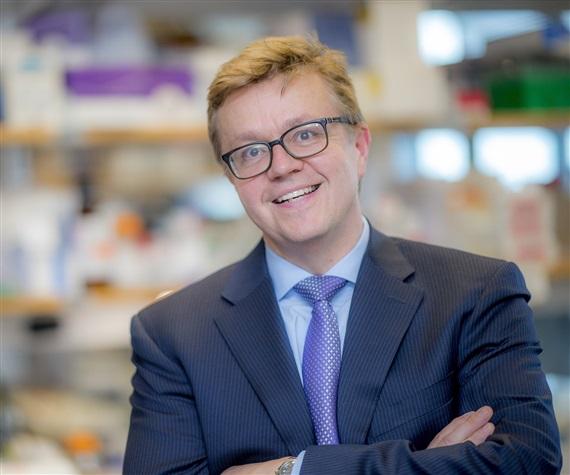Dana-Farber Cancer Institute to Establish Chen-Huang Center for EGFR Mutant Lung Cancers
$5 million gift to support research and care of epidermal growth factor receptor (EGFR) mutant lung cancers
Dana-Farber Cancer Institute will create the Chen-Huang Center for EGFR (epidermal growth factor receptor) Mutant Lung Cancers to stimulate research, promote clinical trials, and strengthen the Institute’s capabilities for studying and treating lung cancer. The Chen-Huang Center is being established with a $5 million gift from Winston Chen, PhD, and his wife, Phyllis Huang, of Silicon Valley.
For many years, the couple's family foundation, the Paramitas Foundation, had focused on supporting higher education, their recent funding has shifted to health care projects, specifically lung cancer care and research led by Pasi Jänne, MD, PhD, director of the Carole M. and Philip L. Lowe Center for Thoracic Oncology, and director of the Robert and Renée Belfer Center for Applied Cancer Science at Dana-Farber.
“Phyllis and I hope our gift will bring much needed attention to lung cancer and illustrate how vital financial support is for making discoveries,” said Chen. “We support Dr. Jänne and Dana-Farber because of their impressive centers, research facilities, and the discoveries they are making every day.”
“While we have made important progress in treating lung cancer, much more needs to be done. This generous gift will allow us to further push the boundaries of knowledge in this area to eventually develop new and better therapies. We are very grateful to Winston Chen and Phyllis Huang for their support to create this new center,” said Laurie H. Glimcher, MD, president and CEO, Dana-Farber Cancer Institute.
More than 200,000 people in the U.S. and more than one million worldwide were diagnosed with lung cancer in 2019. Lung cancer remains the most common cause of cancer-related deaths for both men and women in the U.S. EGFR mutations are found in 15 percent of patients in the U.S. and European Union, and 50 percent of lung cancer patients in Asia.
The Chen-Huang Center will advance care and research through the seamless integration of preclinical, translational, and clinical research, including:
- New and novel clinical trials for patients with EGFR mutant lung cancers
- Translational studies of EGFR mutant lung cancers to ultimately help refine therapeutic approaches for patients
- Discovery studies that focus on the generation of research models
- Education, training, and knowledge exchange opportunities for clinicians, researchers, and trainees from the U.S. and around the world focused on EGFR mutant lung cancers
Jänne, and other investigators at Dana-Farber, discovered that a subset of lung cancers exhibited mutations in the EGFR gene in 2004. These mutations were predictive of the clinical efficacy of EGFR kinase inhibitors. This discovery was one of the first examples of precision medicine for lung cancer and helped catalyze the entire field of precision medicine for patients with lung cancer.
Following the discovery, Dana-Farber was the first center in the United States to begin routine clinical testing for EGFR mutations, which is now the standard of care worldwide. EGFR inhibitors are now used as the initial systemic therapy (instead of chemotherapy) for newly diagnosed patients with advanced EGFR mutant lung cancers.
“Even with significant advances forged by physician-scientists at Dana-Farber and elsewhere, new and novel treatment approaches for patients with EGFR mutant lung cancers are needed,” said Jänne. “This gift will help us continue to be a leader in cancer care and research.”
Jänne will also use this gift to establish the Chen-Huang EGFR Mutant Lung Cancers Endowed Fund, the Chen-Huang EGFR Mutant Lung Cancers Fund, and the Chen-Huang EGFR Mutant Lung Cancers Endowed Lecture. In addition, the gift will provide support for capital projects and strategic initiatives at Dana-Farber.
Media Contacts
If you are a journalist and have a question about this story, please call 617-632-4090 and ask to speak to a member of the media team, or email media@dfci.harvard.edu.
The Media Team cannot respond to patient inquiries. For more information, please see Contact Us.
